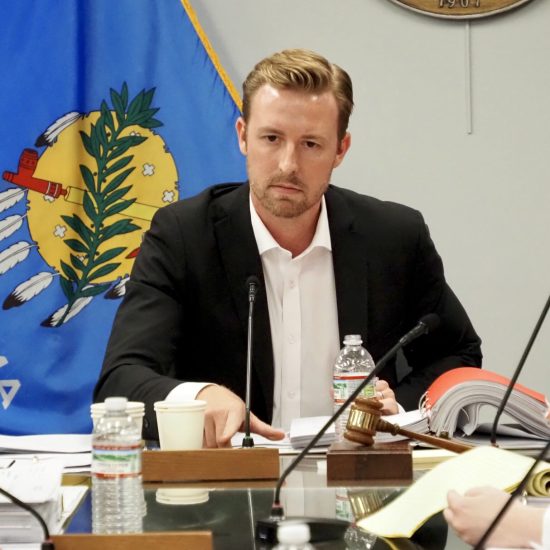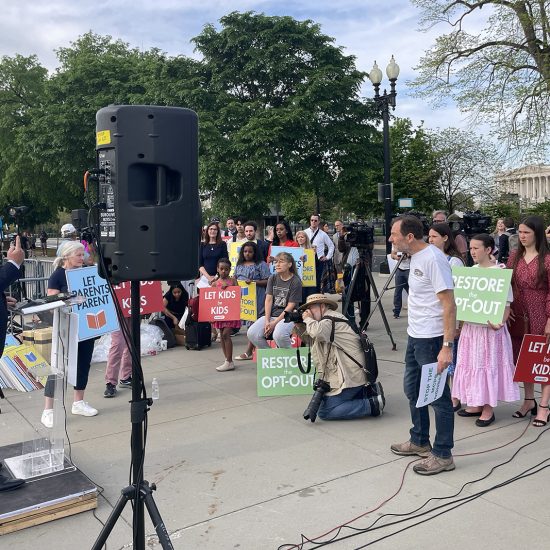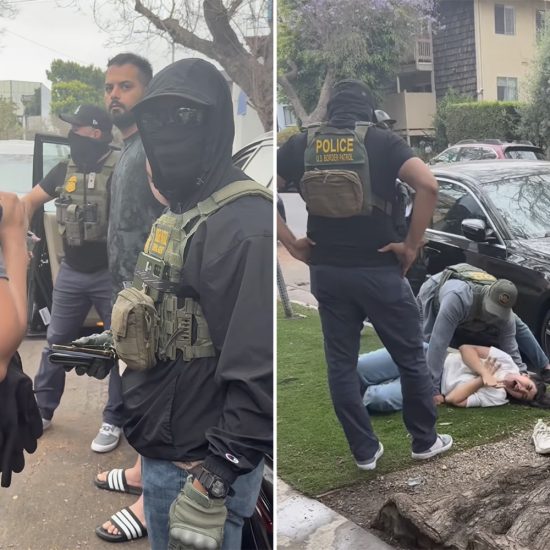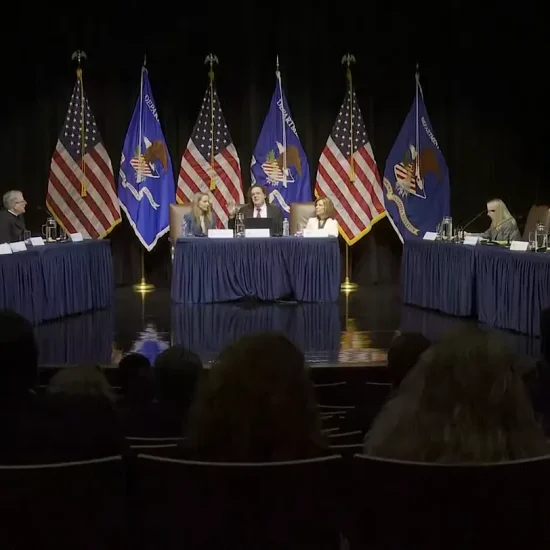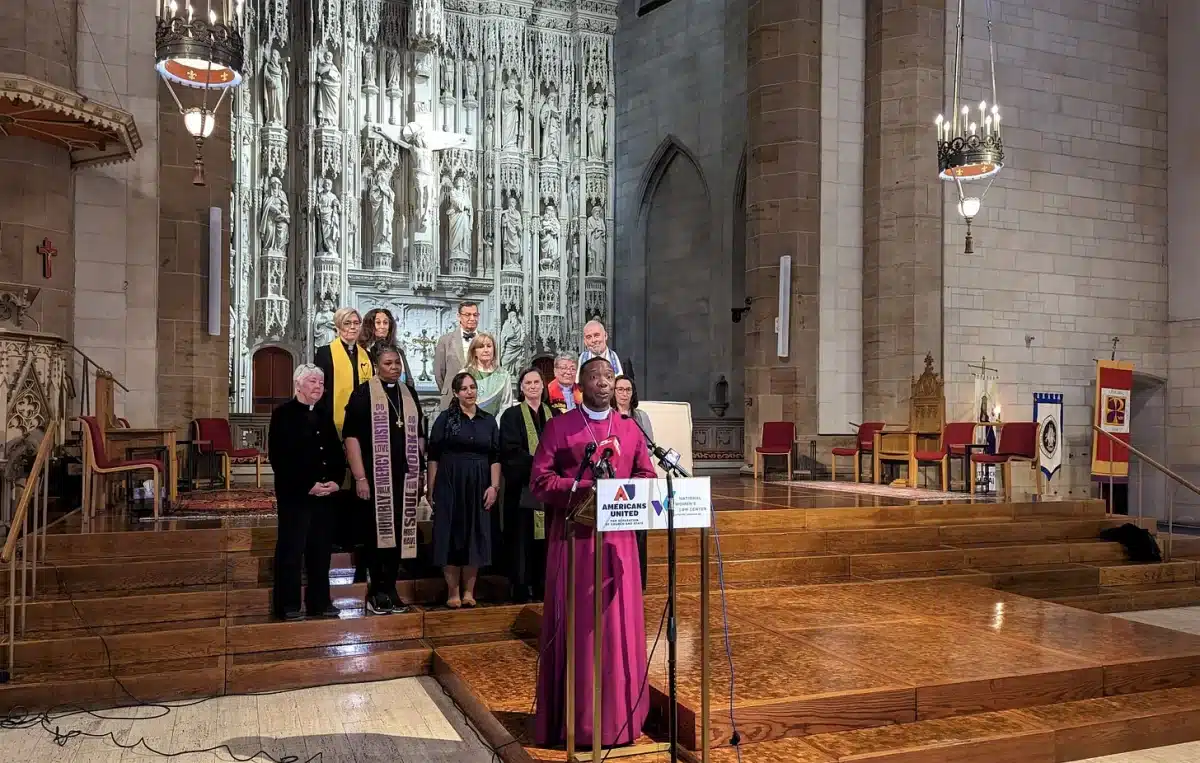
Earlier today (Jan. 19), a group of 13 clergy from six Jewish and Christian traditions in Missouri gathered at Christ Church Cathedral in St. Louis to announce a lawsuit challenging their state’s abortion ban. Their lawsuit contends the 2019 state law that went into effect last year after the U.S. Supreme Court overturned Roe v. Wade violates the Missouri Constitution’s prohibition against religious establishment.
“Legislators do not have the right to impose their faith on me or anyone else,” said lead plaintiff Traci Blackmon, associate general minister of justice and local church ministries for the United Church of Christ. “They’re betraying the separation of church and state that has enabled the religious plurality we enjoy in our state and in our country. … Without this separation, there is neither religious freedom nor just law.”
Four years ago, Missouri lawmakers passed a law banning nearly all abortions, allowing for medical emergencies but not providing exceptions for rape or incest. But since Roe at the time stood as the law of the land, the legislation included a clause that said it would only go into effect if the Supreme Court overturned that 1973 ruling handed down 50 years ago this Sunday (Jan. 22).
Lawmakers in a dozen other states similarly passed trigger laws in recent years. But Missouri was the first to outlaw nearly all abortions after the 5-4 ruling last year in Dobbs v. Jackson Women’s Health Organization that overturned Roe. Just minutes after the ruling officially dropped on June 24, then-Missouri Attorney General Eric Schmitt (now a U.S. Senator) and Gov. Mike Parson issued statements declaring the law was in effect.
But now, the religious language used in the 2019 bill and during the legislative debate is under renewed scrutiny. In addition to the First Amendment of the U.S. Constitution prohibiting religious establishment, Missouri’s Constitution goes even further in advancing church-state separation.
Thus, the new clergy lawsuit — Rev. Traci Blackmon, et al. v. State of Missouri — challenges House Bill No. 126 for unconstitutionally enshrining religious beliefs. At issue is not just what lawmakers and the governor believe. The law itself declares that “Almighty God is the author of life,” language that sparked a warning at the time from an opposing lawmaker who called it a “violation of the separation of church and state.”
“Missouri legislators have enshrined in law a narrow religious view that does not reflect my own beliefs or the views of the Episcopal Church. That is a violation of my religious freedom and the separation of church and state,” explained Rev. Deon Johnson, one of the plaintiffs and the bishop of the Episcopal Diocese of Missouri.
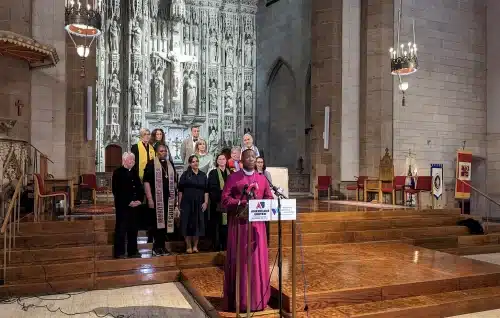
Rev. Deon Johnson of the Episcopal Diocese of Missouri speaks during a press conference at Christ Church Cathedral in St. Louis, Missouri, on Jan. 19, 2023. (Brian Kaylor/Word&Way)
Rev. Barbara Phifer, a plaintiff who is a retired United Methodist minister and now a member of the Missouri House of Representatives, said she agrees with the claim about Almighty God, but argued it shouldn’t be part of state law. She added, “It is not the purview of the state of Missouri either to arbitrate between the richly diverse beliefs of our people or to impose one religious belief on all of us. The Missouri ban on abortion rests firmly on one religious belief.”
In addition to Blackmon, Johnson, and Phifer, other clergy plaintiffs include Rev. Molly Housh Gordon of the Unitarian Universalist Church in Columbia; Rev. Holly McKissick of Peace Church United Church of Christ, Kansas City; Rabbi Jim Bennett of Congregation Shaare Emeth in Creve Coeur; and Maharat Rori Picker Neiss, executive director of the Jewish Community Relations Council of St. Louis. The clergy are represented by Americans United for Separation of Church and State, the National Women’s Law Center, and law firm Arnold & Porter (full disclosure: one of us, Brian, is on the national board of trustees for AU).
The suit is certain to garner national attention, and it might even set new legal precedents in Missouri and beyond. So this issue of A Public Witness considers the state of abortion and religion after the Dobbs case. Then it looks at what makes the new Missouri lawsuit unique as the national debate about abortion and religion continues to smolder.
State of Legal Challenges to Abortion Bans
When the U.S. Supreme Court struck down the landmark Roe ruling with its Dobbs decision last year, it meant there is no longer a national constitutional right to an abortion, and legal rights or restrictions are now entirely in the hands of each state. Some states have responded to this by protecting the legal right to an abortion, while others have enacted sweeping abortion bans.
This patchwork of laws has, predictably, resulted in various lawsuits challenging abortion restrictions. According to the Brennan Center for Justice and the Center for Reproductive Rights, there have been 34 post-Dobbs cases filed in 19 states prior to the announcement of today’s lawsuit — and 27 are still pending a decision.
So far, challenges have resulted in the South Carolina Supreme Court ruling that its state constitution guarantees the right to an abortion, while the Idaho Supreme Court decided that no such right exists. But what is especially relevant to today’s analysis are the various challenges to abortion restrictions that have been mounted on religious grounds.
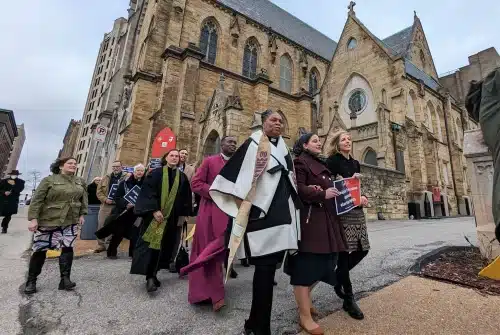
After announcing their lawsuit, clergy plaintiffs lead supporters in a march outside Christ Church Cathedral in St. Louis, Missouri, on Jan. 19, 2023. (Brian Kaylor/Word&Way)
When we talk about “religious freedom” in the legal sense, this typically refers to the First Amendment to the U.S. Constitution where there are two key clauses regarding religion: one about no establishment and one on free exercise. The Establishment Clause protects us from government-sponsored religion, which is meant to prohibit both governmental control of religious groups as well as theocratic authority over governmental power. The Free Exercise Clause refers to the right for us to engage in religious beliefs and expressions (or not) however we so choose.
It is precisely this Free Exercise Clause that has served as the foundation for several recent religious freedom challenges to abortion restrictions in Indiana, Kentucky, Utah, Wyoming, and Florida. These lawsuits claim that abortion access is, for some people, directly linked to practicing their religion. The challenges focus on the idea that theological teachings allowing abortions in some capacity can be found in a wide array of religious traditions including Judaism, Islam, mainline Christianity, Unitarian Universalism, and Paganism.
After citing a controversial state religious freedom law that then-Gov. Mike Pence signed into law in 2015, the Indiana challenge to the state’s abortion ban even specifically points to Jewish teachings conveying that a fetus is not yet deemed a person until birth. As Sheila Katz, head of the National Council of Jewish Women, told Religion News Service, “The Torah is clear on this issue: Abortion is not only permitted in Judaism, but in some cases required when the life of the pregnant person is at stake.” The Kentucky lawsuit also cites three different Jewish women who wish to start a family and require in vitro fertilization to become pregnant but are unclear about how definitions of when life begins that differ from their own will impact things like a possible stillbirth or frozen embryos.
But now a different legal strategy is emerging in Missouri.
Help sustain the ministry of Word&Way by subscribing to A Public Witness!
Show-Me Establishment
The Missouri suit is different from other abortion ban challenges in a couple of significant ways. And these differences could impact not only its success in the Show-Me State but perhaps even national legislation and conversations about the topic.
Rather than making a claim about the free exercise of religion, the Missouri case is focused on the issue of religious establishment. A successful free exercise claim would generally leave a law intact but allow some people with religious objections an exception from having to fully follow it. But if a law violates church-state establishment, it is struck down completely. As Rachel Laser, president & CEO of Americans United, explained during Thursday’s announcement of the litigation, they are not merely trying to carve out a religious exemption for some people but instead seeking to nullify the entire abortion ban.
Additionally, the Missouri case does not make a claim under the U.S. Constitution’s First Amendment. Rather, it focuses on Missouri’s stricter clauses separating church and state. That not only could create a stronger standard for analyzing the arguments but also makes the Missouri Supreme Court the ultimate authority for this lawsuit (instead of the U.S. Supreme Court with the very justices who decided the Dobbs case).
As the lawsuit notes, Missouri’s Constitution includes several long sections about religious liberty to protect both the principles of free exercise and no establishment.
“Neither the state nor any of its political subdivisions shall establish any official religion,” the Constitution promises. “No preference shall be given to nor any discrimination made against any church, sect or creed of religion, or any form of religious faith or worship.”
Speaking about the “trailblazing lawsuit,” Laser highlighted “Missouri’s strong and longstanding commitment to the separation of church and state.” Thus, she added, “It’s time to hold Missouri to that promise.”
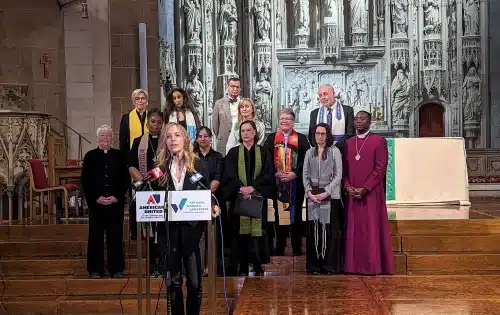
Rachel Laser, president & CEO of Americans United for Separation of Church and State, speaks during a press conference at Christ Church Cathedral in St. Louis, Missouri, on Jan. 19, 2023. (Brian Kaylor/Word&Way)
Despite the constitutional language, lawmakers in 2019 made it clear they wanted to enshrine their religious beliefs through an abortion ban. In addition to the language about “Almighty God” in the law itself, the clergy lawsuit also notes numerous comments made by lawmakers during the legislative debate.
“Consistent with H.B. 126’s enshrinement of religious principles in the bill’s text, the legislative sponsors and other supporters of H.B. 126 repeatedly emphasized their religious intent in enacting the legislation,” the suit notes. “For example, the bill’s lead sponsor, Rep. Nick Schroer, explained that ‘as a Catholic I do believe life begins at conception and that is built into our legislative findings.’ One of the bill’s co-sponsors, Rep. Barry Hovis, stated that he was motivated ‘from the Biblical side of it, … life does occur at the point of conception.’ Another co-sponsor, Rep. Ben Baker, stated: ‘From the one-cell stage at the moment of conception, you were already there … you equally share the image of our Creator … you are his work of art.’ Another supporter, Rep. Holly Thompson Rehder, urged passage of H.B. 126 by exhorting her colleagues: ‘God doesn’t give us a choice in this area. He is the creator of life. And I, being made in his image and likeness, don’t get to choose to take that away, no matter how that child came to be. To me, life begins at conception, and my God doesn’t give that option.’”
With the lawmakers saying the quiet part out loud with those and other comments documented in the lawsuit, the clergy plaintiffs contend “the true purpose and effect of these laws was to enshrine certain religious beliefs in law” and “a specifically conservative Christian, religious view about the beginning of life.” Such actions, the suit adds, “straightforwardly violate the Missouri Constitution’s robust protections for the religious freedom of all Missourians.”
Asserting such a state constitutional violation, the plaintiffs now seek relief from the courts to strike down Missouri’s abortion ban.
Future Fights
We obviously don’t know exactly how this will all unfold. The lawsuit might find favor with state judges. It seems highly likely this case eventually shows up in the Missouri Supreme Court. Even before that, the litigation is sure to spark political actions by lawmakers who passed and still support the abortion ban.
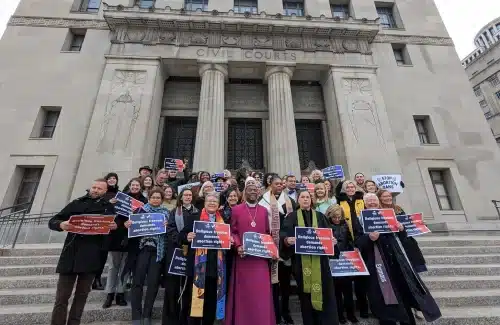
Plaintiff clergy and supporters stand outside the St. Louis Circuit Court building after marching there following their press conference in St. Louis, Missouri, on Jan. 19, 2023. (Brian Kaylor/Word&Way)
The lawsuit will also add to the ongoing national conversations about abortion and religion. Regardless of one’s beliefs on when life begins, the suit raises important questions about the role of religion in policymaking. In an increasingly pluralistic society, governing becomes more difficult to balance divergent religious beliefs. That’s why, regardless of what one thinks about abortion or other hot-button issues, church-state separation remains critically important.
“Democracy itself rests on church-state separation,” Rachel Laser of Americans United explained during Thursday’s press conference. “America needs a national recommitment to church-state separation. Let’s start right here with Missouri.”
As a public witness,
Brian Kaylor & Jeremy Fuzy

